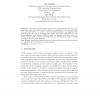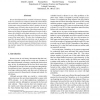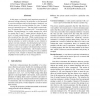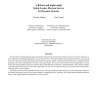13457 search results - page 9 / 2692 » Can we elect if we cannot compare |
AAAI
2010
13 years 9 months ago
2010
The concept of distance rationalizability allows one to define new voting rules or "rationalize" existing ones via a consensus class of elections and a distance. A conse...
JUCS
2006
13 years 7 months ago
2006
Abstract: We present two probabilistic leader election algorithms for anonymous unidirectional rings with FIFO channels, based on an algorithm from Itai and Rodeh [Itai and Rodeh 1...
ICDAR
2009
IEEE
14 years 2 months ago
2009
IEEE
Recent developments have resulted in dramatic changes in the way elections are conducted, both in the United States and around the world. Well-publicized flaws in the security of...
CSFW
2006
IEEE
14 years 1 months ago
2006
IEEE
In this paper we formally study important properties of electronic voting protocols. In particular we are interested in coercion-resistance and receipt-freeness. Intuitively, an e...
DSN
2008
IEEE
14 years 1 months ago
2008
IEEE
We describe the implementation and experimental evaluation of a fault-tolerant leader election service for dynamic systems. Intuitively, distributed applications can use this serv...




